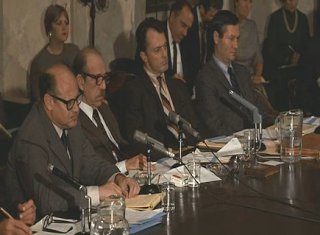 A major portion of Francis Ford Coppola's The Godfather, Part II (1974) involves Michael Corleone's interrogation by the United States Senate. Having returned from Cuba, where his business venture crumbles during Fidel Castro's revolution, Michael's faced with an investigation initiated by his rival, Hyman Roth. The Senators interrogate Michael's henchman, Willie Cicci, who provides information on the Corleone family and his own crimes, but can't implicate Michael directly. "The family had a lot of buffers!" he announces to general amusement.
A major portion of Francis Ford Coppola's The Godfather, Part II (1974) involves Michael Corleone's interrogation by the United States Senate. Having returned from Cuba, where his business venture crumbles during Fidel Castro's revolution, Michael's faced with an investigation initiated by his rival, Hyman Roth. The Senators interrogate Michael's henchman, Willie Cicci, who provides information on the Corleone family and his own crimes, but can't implicate Michael directly. "The family had a lot of buffers!" he announces to general amusement.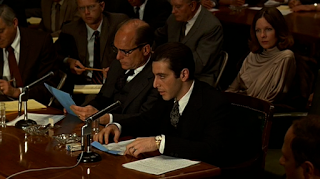 Michael later testifies, confronting allegations about his criminal empire and personal transgression. Michael coolly denies their accusations, then reads a prepared statement emphasizing his lack of criminal record and World War II service. Afterwards, he's notified that the committee has a surprise witness: Frank Pentangeli, Michael's capo who survived a hit by Roth's henchmen, then turned against Michael for immunity.
Michael later testifies, confronting allegations about his criminal empire and personal transgression. Michael coolly denies their accusations, then reads a prepared statement emphasizing his lack of criminal record and World War II service. Afterwards, he's notified that the committee has a surprise witness: Frank Pentangeli, Michael's capo who survived a hit by Roth's henchmen, then turned against Michael for immunity. Things don't go according to plan. Michael convinces Pentangeli's brother, Vincenzo, to attend the hearing, either has a threat against Vincenzo life or reminder of the Mob code of omerta. Pentangeli loses his nerve, claiming he invented his testimony under duress. The committee dissolves, with Michael walking scot free. Later, Tom Hagen persuades Pentangeli to commit suicide, saving his family and preserving his honor.
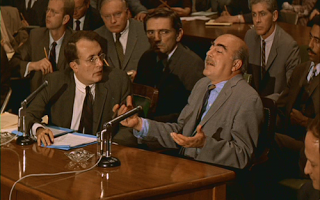 Coppola and Mario Puzo modeled these scenes off the Kefauver Committee, an early '50s Senate body which investigated organized crime. The committee yielded no convictions, with many speculating that its instigator, Senator Estes Kefauver (D-TN) merely wanted publicity for a president campaign. (Kefauver ran in 1956, losing the nomination to Adlai Stevenson; he became Stevenson's running mate). It did, however, plant the Mafia in America's public consciousness: the hearings were widely televised, providing glimpses of underworld figures like Frank Costello and Meyer Lansky.
Coppola and Mario Puzo modeled these scenes off the Kefauver Committee, an early '50s Senate body which investigated organized crime. The committee yielded no convictions, with many speculating that its instigator, Senator Estes Kefauver (D-TN) merely wanted publicity for a president campaign. (Kefauver ran in 1956, losing the nomination to Adlai Stevenson; he became Stevenson's running mate). It did, however, plant the Mafia in America's public consciousness: the hearings were widely televised, providing glimpses of underworld figures like Frank Costello and Meyer Lansky.Another inspiration came from Joe Valachi. A henchman for Vito Genovese, Valachi was already jailed when he murdered another inmate, whom he feared. Threatened with life imprisonment or death, Valachi turned states evidence against Genovese, testifying before the McClellan committee in 1963. Like Willie Cicci, Valachi was too low-ranking to incriminate his bosses. But he did provide useful history and organizational detail on the Mafia, which assisted Federal prosecutors in future investigations.
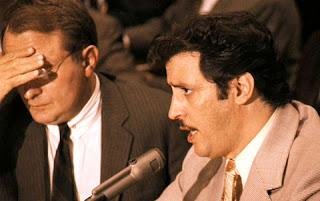 Coppola filmed these scenes in two days, using unfiltered cameras and sound to create a newsreel look. He also cast non-actors as the Senators. Reviewing footage of the Kefauver hearings, Coppola was struck by the Senators' awkwardness on film. "I asked myself, how could I achieve that effect?" Coppola recalled. "I'll pick writers, producers and directors, all thinking men but untrained as actors." He achieves the desired realism, with the Senators fluffing lines, referring to scripts and acting unrehearsed. But who are these men?
Coppola filmed these scenes in two days, using unfiltered cameras and sound to create a newsreel look. He also cast non-actors as the Senators. Reviewing footage of the Kefauver hearings, Coppola was struck by the Senators' awkwardness on film. "I asked myself, how could I achieve that effect?" Coppola recalled. "I'll pick writers, producers and directors, all thinking men but untrained as actors." He achieves the desired realism, with the Senators fluffing lines, referring to scripts and acting unrehearsed. But who are these men?The making of The Godfather trilogy is well-documented, but there's a lot of vagueness and misinformation, both in printed works and the Internet, about these pivotal scenes. If nothing else, Godfather fans and trivia buffs might appreciate the chance to put faces to names.
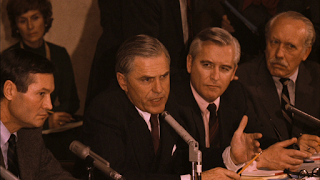 G.D. Spradlin (Senator Pat Geary) needs no introduction, as he's a major character in the film. A Nevada Senator, Geary tries "squeezing" Michael for a gaming license, only to be blackmailed in turn for murdering a prostitute. Geary later joins Michael in Cuba and turns up on the committee interrogating him. Having previously denounced Italian-Americans as oily criminals, he gives a ridiculous speech espousing Italian contributions to America, inspiring spectator applause and Senate befuddlement.
G.D. Spradlin (Senator Pat Geary) needs no introduction, as he's a major character in the film. A Nevada Senator, Geary tries "squeezing" Michael for a gaming license, only to be blackmailed in turn for murdering a prostitute. Geary later joins Michael in Cuba and turns up on the committee interrogating him. Having previously denounced Italian-Americans as oily criminals, he gives a ridiculous speech espousing Italian contributions to America, inspiring spectator applause and Senate befuddlement.A larger-than-life figure, Spradlin was as interesting as any of his characters. Born in Paul's Valley, Oklahoma, Spradlin worked as a lawyer, oil producer and political ad man. He ran John F. Kennedy's Oklahoma campaign in 1960, making him natural casting for a Senator. But Spradlin's real passion was acting, joining the Oklahoma Repertory Theatre before moving into film. Pre-Godfather roles include Tom Gries' Will Penny (1968) and Michaelangelo Antonioni's Zabriskie Point (1970).
Spradlin remained a prolific character actor, specializing in Geary-esque slimeballs. Besides Godfather, Part II, his best-known role came as the domineering basketball coach in Lamont Johnson's One on One (1977). Coppola used him again in Apocalypse Now (1979) as the General briefing Captain Willard. Spradlin died in July 2011.
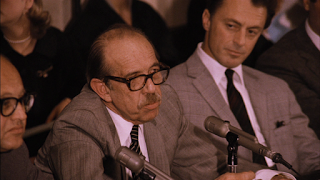 William Bowers (Senator Kane) is the exasperated committee chairman. He's constantly irritated, whether by Willie Cicci's flippancy ("No, I don't know! Tell me") or Geary's bizarre speech. He snidely challenges Michael to read his statement ("I'm sure we're all very impressed"), then threatens him with perjury. When Pentangeli retracts his testimony, Kane loses his cool and recesses the hearing. It's a lovely character performance, especially from a non-actor.
William Bowers (Senator Kane) is the exasperated committee chairman. He's constantly irritated, whether by Willie Cicci's flippancy ("No, I don't know! Tell me") or Geary's bizarre speech. He snidely challenges Michael to read his statement ("I'm sure we're all very impressed"), then threatens him with perjury. When Pentangeli retracts his testimony, Kane loses his cool and recesses the hearing. It's a lovely character performance, especially from a non-actor.Bowers had an impressive career. Born in Las Cruces, New Mexico, Bowers began as a journalist, then published a stage play. Bowers became a prolific screenwriter, penning the Cole Porter biopic Night and Day (1946) and the Oscar-nominated script for The Gunfighter (1950), Henry King's classic Western. He also penned the noirs Split Second (1953) and Tight Spot (1955), the David Niven vehicle My Man Godfrey (1957) and earned a second Oscar nod for The Sheepman (1957). He also worked in television.
One of the strangest incidents in Bowers' career involved The Last Time I Saw Archie (1961), a service comedy starring Robert Mitchum and Jack Webb. Bowers drew on personal experience, having served in the Civilian Pilot Training Program in World War II. However, Bowers based Mitchum's character on Arch Hall, Sr., producer of Z-grade schlock like Eegah! (1962). Hall sued the filmmakers, winning a settlement exceeding the budget of Hall's entire filmography.
A lifelong friend of Coppola's, Bowers landed this plum role in Godfather II. His only other acting appearances came on the TV shows Starsky and Hutch and Mobile One. Bowers later worked for Coppola's Zoetrope Studios as a staff writer, though most of his late career work was for television. Bowers died in 1987.
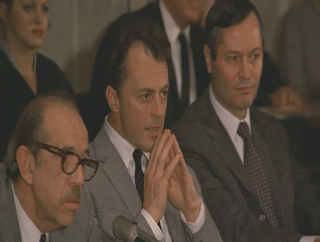 Peter Donat (Questadt) is the crooked Senate Counsel. On the DVD commentary, Coppola says he envisioned the character like a young Richard Nixon interrogating Alger Hiss. Questadt's certainly snide and unpleasant, acting like an ambulance chaser given a national platform. In the shooting script, but not in the finished film, Questadt joins Geary's party in Havana, arguing about America's support for Batista. Later, Michael learns from Fredo Corleone that he's working for Hyman Roth... a revelation which seals Fredo's fate.
Peter Donat (Questadt) is the crooked Senate Counsel. On the DVD commentary, Coppola says he envisioned the character like a young Richard Nixon interrogating Alger Hiss. Questadt's certainly snide and unpleasant, acting like an ambulance chaser given a national platform. In the shooting script, but not in the finished film, Questadt joins Geary's party in Havana, arguing about America's support for Batista. Later, Michael learns from Fredo Corleone that he's working for Hyman Roth... a revelation which seals Fredo's fate.Besides Spradlin, Donat is the only professional actor among the Committee. The nephew of Robert Donat, the Canadian-born Peter worked steadily for decades on stage, screen and television. Appearing in everything from Dallas to Billy Jack Goes to Washington (1976) and David Fincher's The Game (1997), Donat is probably best-known as Bill Mulder on The X-Files. It's nice to know that before joining the Cigarette-Smoking Man, Mulder's dad apprenticed with Hyman Roth!
Several Internet sources claim that Donat originally auditioned for Tom Hagen in The Godfather. Interesting if true, but I haven't found any solid verification. As we'll see, the Internet Movie Database isn't the most reliable source of information.
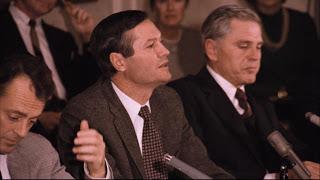 Roger Corman (Senator Weekler) has only two lines, asking Michael to identify Vincenzo Pentangeli, Frank's brother who arrives to intimidate Frank into recanting his testimony. The script describes him as "very smooth, partly liberal, Tammany Hall." Interestingly, he's the one who originally gave Geary's speech praising Italian-Americans, which makes sense for a Senator with so many Italian constituents.
Roger Corman (Senator Weekler) has only two lines, asking Michael to identify Vincenzo Pentangeli, Frank's brother who arrives to intimidate Frank into recanting his testimony. The script describes him as "very smooth, partly liberal, Tammany Hall." Interestingly, he's the one who originally gave Geary's speech praising Italian-Americans, which makes sense for a Senator with so many Italian constituents.Corman is the impresario who produced and directed a variety of B Movies: sci-fi movies (It Conquered the World), biker flicks (The Wild Angels), Edgar Allen Poe adaptations (The Raven). He directed one studio film, The St. Valentine's Day Massacre (1967), for Twentieth Century Fox. Despite its success, Corman preferred the exploitation grind, where he's remained ever since: he's still producing movies like Sharktopus (2010).
Besides providing MST3K fodder, Corman's films gave early launches to directors like Peter Bogdanovich and Martin Scorsese, actors like Dennis Hopper and Jack Nicholson. Another was Coppola, who "directed" his Battle Beyond the Sun (1962), a re-edited Russian sci-fi flick, along with the horror film Dementia 13 (1963). "Roger was always straight - he never gave you any false hope," Coppola said. "He was always very precise about what you were going to get and do."
Corman describes shooting The Godfather, Part II in his memoirs, How I Made a Hundred Movies in Hollywood and Never Lost a Dime. "There were close-ups on me, harsh, blinding lights... I was behind those lights for two days." He recounts Jack Nicholson, another Corman veteran, visiting the set to rib his performance: "Your entire career in Hollywood depends on how you say your lines." Corman made a mini-career acting in his protégés' works: he's the FBI director in Jonathan Demme's The Silence of the Lambs (1993) and a Congressman in Ron Howard's Apollo 13 (1995).
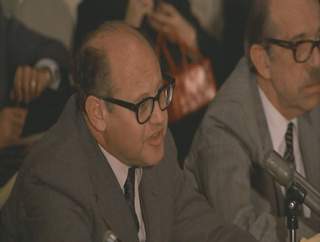 Phil Feldman (Senator Rogers) objects to Michael reading his statement and leads the interrogation of Frank Pentangeli.
Phil Feldman (Senator Rogers) objects to Michael reading his statement and leads the interrogation of Frank Pentangeli. Michael Goodwin and Naomi Wise (On the Edge: The Life and Times of Francis Coppola) provide an interesting sketch of Feldman's career. He graduated from Harvard Law School and practiced as an attorney, then served as a codebreaker in World War II, decrypting Japanese military cyphers. Feldman worked for the talent agency Famous Artists before joining the production company Seven Arts, which later merged with Warner Bros. He produced Coppola's film You're a Big Boy Now (1966) over the objections of studio heads, earning Coppola's gratitude.
Afterwards, Feldman produced two Sam Peckinpah films, The Wild Bunch (1969) and The Ballad of Cable Hogue (1970). He somehow managed a close working relationship with "Bloody Sam" until they feuded over Cable Hogue's distribution. His only other onscreen appearance was John Badham's Blue Thunder (1983). Feldman worked in Hollywood until his death in 1991; his son, Dennis Feldman, also became a producer.
In The Godfather Legacy, Harlan Lebo writes that Buck Houghton, producer of The Twilight Zone, plays one of the nonspeaking Senators, though we'd need pictures to confirm which one. That leaves four unaccounted for.
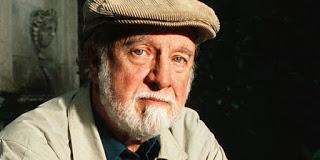 One persistent myth surrounding The Godfather, Part II is that Richard Matheson, famous science fiction writer, played one of the Senators. This is repeated ad nauseum online: IMDB lists Matheson as "Senator #3 (uncredited)", while The Godfather Wiki offers contradictory information. Though its page on Matheson categorically denies his presence, his alleged character, Senator King (never identified onscreen), is credited to Matheson.
One persistent myth surrounding The Godfather, Part II is that Richard Matheson, famous science fiction writer, played one of the Senators. This is repeated ad nauseum online: IMDB lists Matheson as "Senator #3 (uncredited)", while The Godfather Wiki offers contradictory information. Though its page on Matheson categorically denies his presence, his alleged character, Senator King (never identified onscreen), is credited to Matheson. This is easy enough to debunk: Matheson denies appearing in the film in The Richard Matheson Companion, he's uncredited, and there isn't any hard evidence to back these claims. Perhaps Matheson's association with Roger Corman (writing several screenplays for him) started this rumor? While several senators don't speak and are unaccounted for, it's unlikely Matheson's among them.
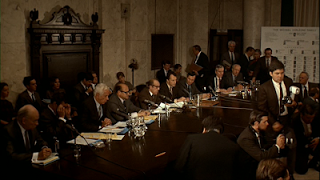 Reportedly, Coppola cast several real journalists as the press gaggle covering the hearings. It's hard to identify anyone, since they only appear in long shot. Gary Kurtz, producer of Star Wars and The Empire Strikes Back, is one of the photographers. That's supposedly him kneeling in the bottom right, but he's too obscured to get a clear screencap.
Reportedly, Coppola cast several real journalists as the press gaggle covering the hearings. It's hard to identify anyone, since they only appear in long shot. Gary Kurtz, producer of Star Wars and The Empire Strikes Back, is one of the photographers. That's supposedly him kneeling in the bottom right, but he's too obscured to get a clear screencap. If anyone knows the identities of the remaining Senators, please comment or email me and I will update accordingly. Until then, I hope this article helps clear some discrepancies in Godfather ephemera.
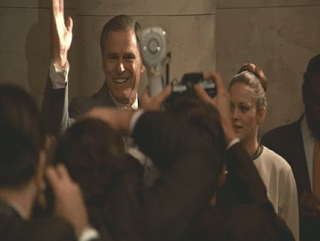 Acknowledgments:
Acknowledgments:Besides the print resources cited herein, The Godfather Wiki provides useful information on sources, a copy of the shooting script, and some of the screenshots. The Richard Matheson picture comes from The Examiner. This excellent article by John at Homages, Ripoffs, and Coincidences provides the tidbit about Gary Kurtz, along with other cameos throughout the trilogy.

